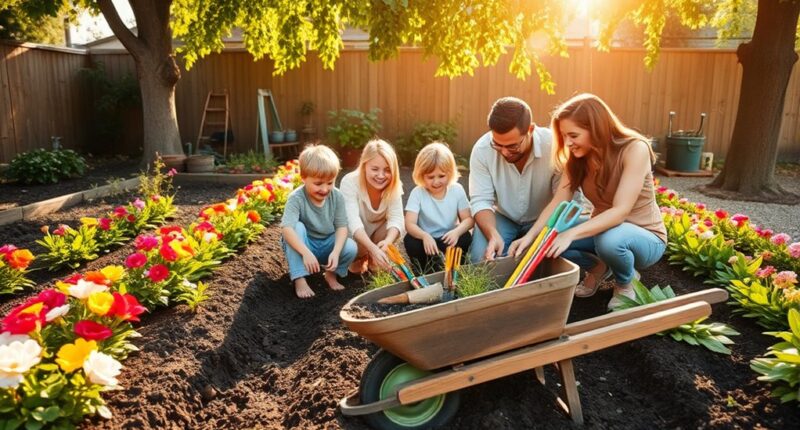Gardening as a family activity not only boosts your health but also strengthens your bonds. You’ll burn calories while enjoying fresh air and sunshine, all while growing nutritious foods. Kids get hands-on learning about science and responsibility, and they’re more likely to eat veggies they’ve helped cultivate. Plus, gardening builds community connections and nurtures emotional well-being. Discover how to make the most of your family garden experience in the sections ahead.
Key Takeaways
- Gardening together promotes physical fitness by burning calories and enhancing hand strength, making it a healthy family activity.
- Involving children in gardening increases their likelihood of eating vegetables and fosters a love for nutritious foods.
- Gardening provides educational experiences, teaching children about plant life cycles and responsibility while integrating various subjects.
- Community gardening strengthens social connections and encourages collaboration among families, enhancing community bonds.
- Creating an accessible garden space allows all family members to participate, ensuring inclusivity and shared enjoyment.
The Health Benefits of Gardening for Families
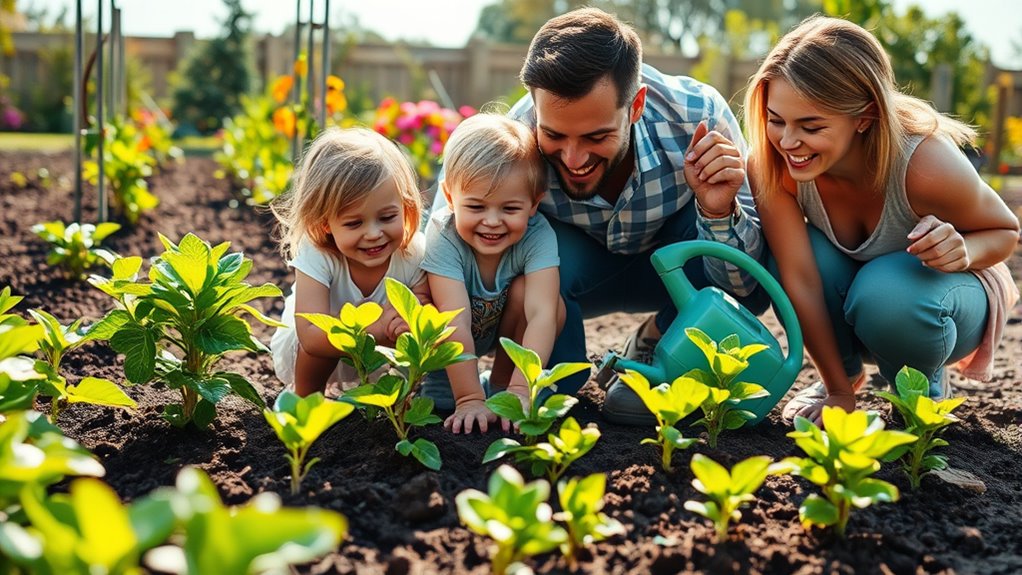
When you engage in gardening as a family, you’re not just cultivating plants; you’re also nurturing your health. Digging, weeding, and planting boost your cardiovascular fitness and can burn up to 240 calories per hour. You’ll notice increased hand strength and flexibility, thanks to the physical tasks involved. Plus, soaking up sunlight while gardening enhances your vitamin D levels, benefiting your bones and immune system. Additionally, gardening activities contribute to daily physical activity goals, making it a fun way to stay active together. On an emotional level, gardening reduces stress and anxiety, improving your mood through the release of serotonin. The shared experience fosters teamwork and communication among family members, reinforcing bonds.
Nutritional Improvements Through Family Gardening
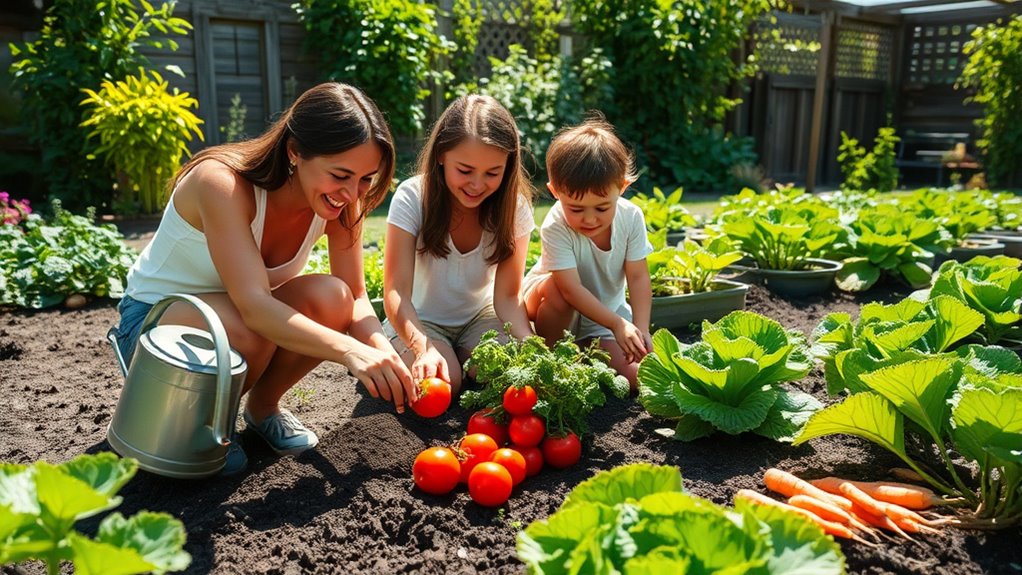
Gardening together not only promotes physical and mental well-being but also greatly enhances your family’s nutrition. When you grow your own fruits and vegetables, you naturally increase your family’s consumption of these nutrient-rich foods. You’ll encourage dietary variety, trying new produce that packs vitamins and minerals essential for health. Seasonal gardening fosters diverse eating habits, giving you access to fresh ingredients year-round. Additionally, incorporating meal replacement juices from your home-grown produce can further boost nutrient intake while promoting healthy habits. Freshly squeezed juices, such as those from your garden’s oranges, can provide essential nutrients that benefit overall health, including vital vitamin C that supports your immune system. Plus, kids involved in gardening are more likely to eat the vegetables they helped grow, reducing reliance on processed foods. This hands-on experience cultivates an appreciation for food sources, leading to healthier dining choices and shared meals made with love. Furthermore, engaging in newborn feeding options such as fresh, home-grown produce can set an example of healthy eating for children from a young age. Moreover, growing your own food encourages low carb high protein breakfasts, which can support your family’s nutritional needs for energy and health.
Additionally, gardening activities provide functional movement that contributes to overall health and fitness for the whole family. Ultimately, family gardening creates a deeper connection to food and nutrition, benefiting everyone’s well-being.
Educational Opportunities for Children in the Garden
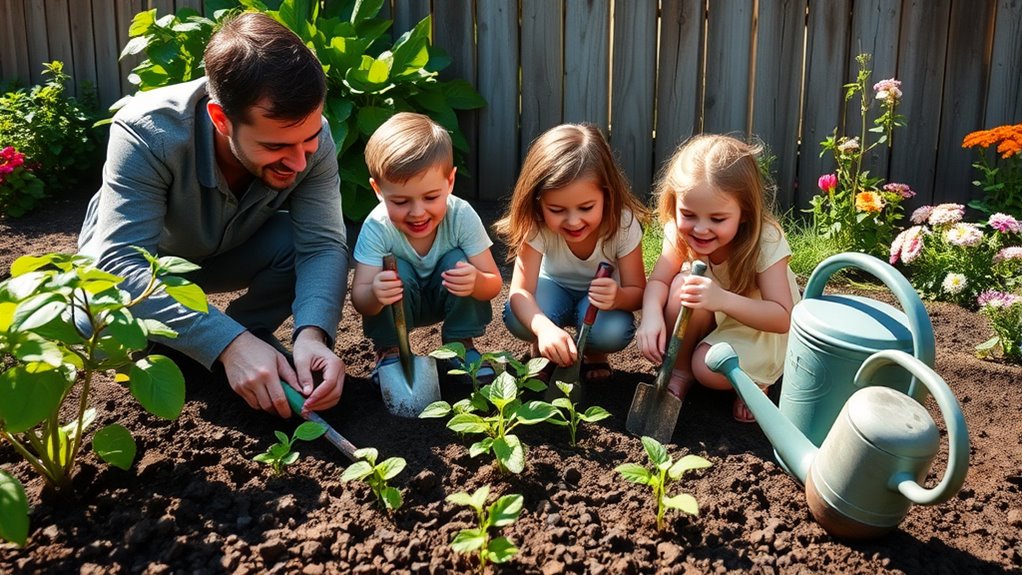
Through engaging in gardening activities, children access a wealth of educational opportunities that extend beyond traditional classroom learning.
Gardening offers hands-on experiences, allowing them to explore scientific concepts like plant life cycles and pollinators. It integrates with subjects such as math, language arts, and art, turning the garden into a living laboratory where they can conduct experiments and observe nature. Additionally, children can learn about sustainable practices while managing their garden, which can enhance their understanding of environmental stewardship. Children also experience emotional and psychological growth as they connect with nature, fostering a sense of well-being. Moreover, engaging in gardening activities can promote awareness of traditional healing practices, linking them to broader cultural and environmental contexts. Research shows that children who garden are more likely to develop a strong sense of biodiversity awareness, which can enhance their connection to the environment.
As they care for plants, kids learn responsibility, patience, and problem-solving skills. Gardening also enhances cognitive and motor skills through physical tasks and sensory exploration. With resources from programs like Master Gardener and Project Learning Tree, children gain knowledge about sustainable practices and environmental stewardship, fostering a deep connection to nature and their community. Additionally, gardening fosters pro-environmental attitudes in children, which can lead to lifelong appreciation for the environment.
Strengthening Community and Social Connections
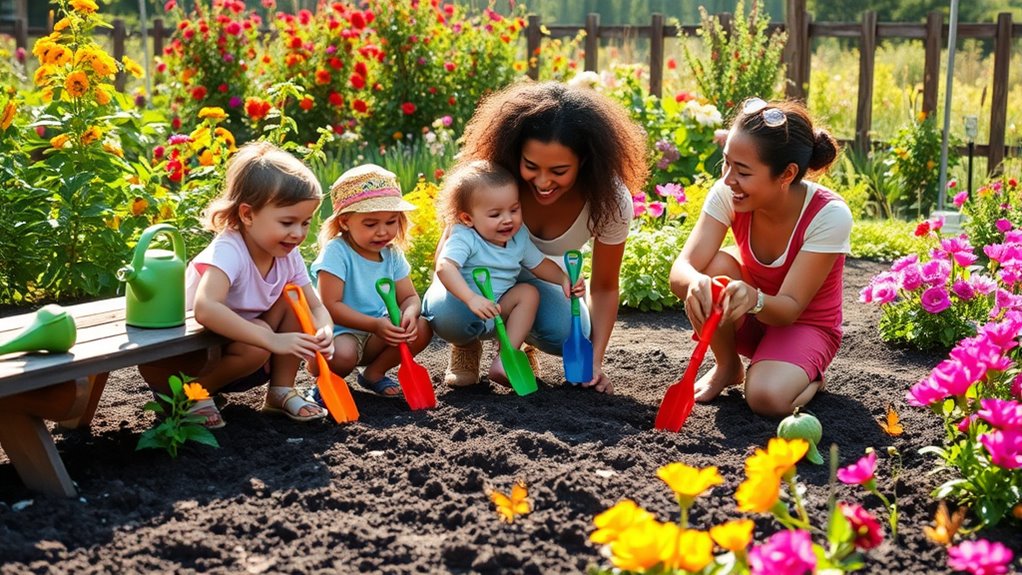
Experiencing the wonders of gardening together not only enriches children’s learning but also strengthens community ties and social connections.
When you participate in community gardens, you engage with individuals from various backgrounds, fostering social cohesion and shared responsibility. These spaces create opportunities for cross-generational interactions, enhancing integration and breaking down barriers. Community gardens also encourage connection with diverse individuals within the community, further deepening these relationships. Additionally, these gardens can serve as platforms for sharing halal culinary traditions that celebrate cultural diversity. Moreover, gardening promotes a sense of well-being through exposure to nature’s health benefits, enhancing emotional resilience and overall happiness. Engaging in gardening can also alleviate feelings of isolation, similar to how seniors texting humor fosters connection among older adults. Community gardening initiatives often emphasize sustainable travel practices, highlighting the importance of eco-friendly methods in local food production. Furthermore, creating consistent routines around gardening activities can help families establish stronger bonds and stability.
Gardening together builds trust and understanding, promoting teamwork and collaboration. As you work alongside others, you share knowledge and skills, making lasting bonds that enrich your community’s cultural fabric.
Plus, these collective efforts empower you and your neighbors, encouraging civic engagement and responsibility.
Ultimately, community gardening transforms not just the land but the relationships among participants, cultivating a sense of belonging and resilience.
Positive Environmental Impact of Family Gardening
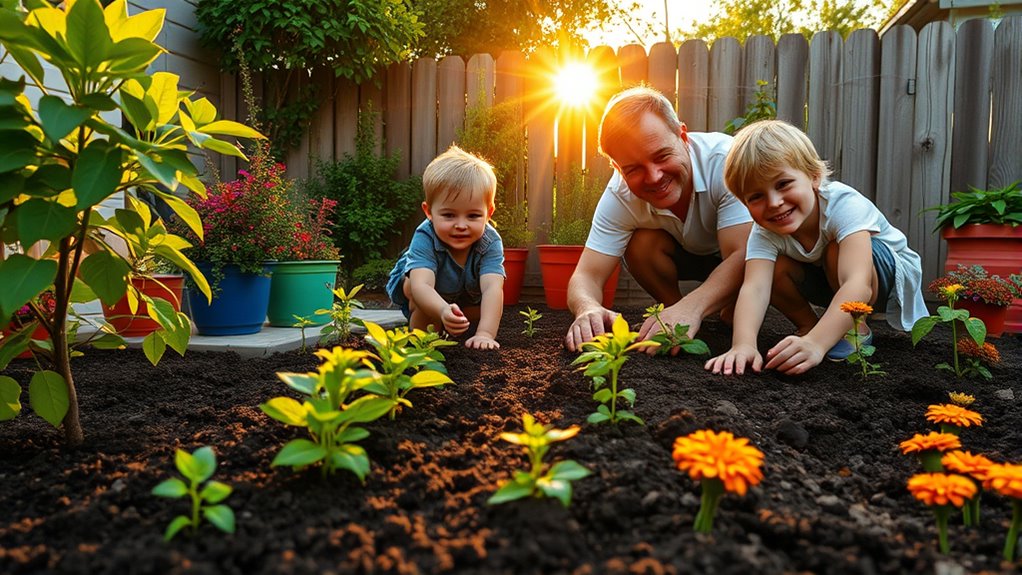
While you cultivate your family garden, you’re not just nurturing plants; you’re also making a positive environmental impact.
By growing a variety of plants, you promote biodiversity, providing habitats for insects, birds, and small mammals. Your garden absorbs carbon dioxide, helping mitigate climate change while improving air quality by filtering pollutants.
Sustainable practices like composting and rainwater harvesting enhance soil health and conserve water. Plus, native plant selection reduces maintenance needs and encourages local adaptation.
As you engage in this activity, you’re also teaching your family about sustainability, environmental responsibility, and the importance of local food production.
Your garden becomes a living lesson, fostering appreciation for nature and creating a healthier planet for everyone.
Enhancing Family Dynamics and Relationships
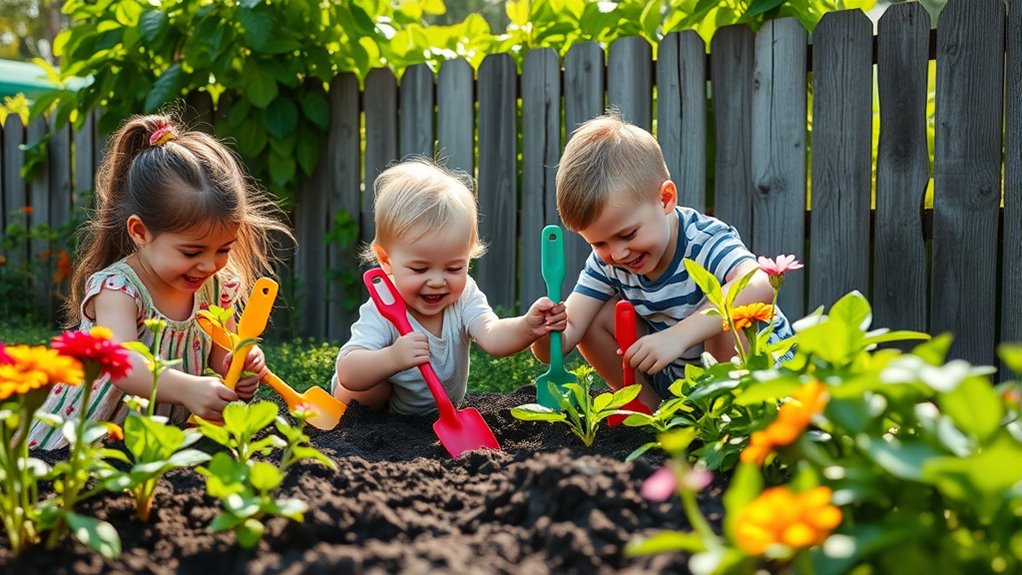
Gardening can transform family dynamics by creating shared experiences that strengthen relationships. When you work together in the garden, you foster a sense of unity and shared responsibility. This collaboration encourages communication, allowing family members to engage in open dialogue, making interactions feel more relaxed and natural. As you celebrate small successes, like the first harvest, you create lasting memories that bind you closer together.
Gardening also teaches valuable life skills, instilling a sense of responsibility and resilience in both children and adults. Plus, the calming effects of nature help reduce stress, providing a peaceful environment for family bonding. Ultimately, gardening nurtures connections that enrich your family life and promote teamwork. Additionally, engaging in outdoor activities can serve as an effective way to develop strong support networks that enhance emotional well-being.
Tips for Successful Family Gardening Projects
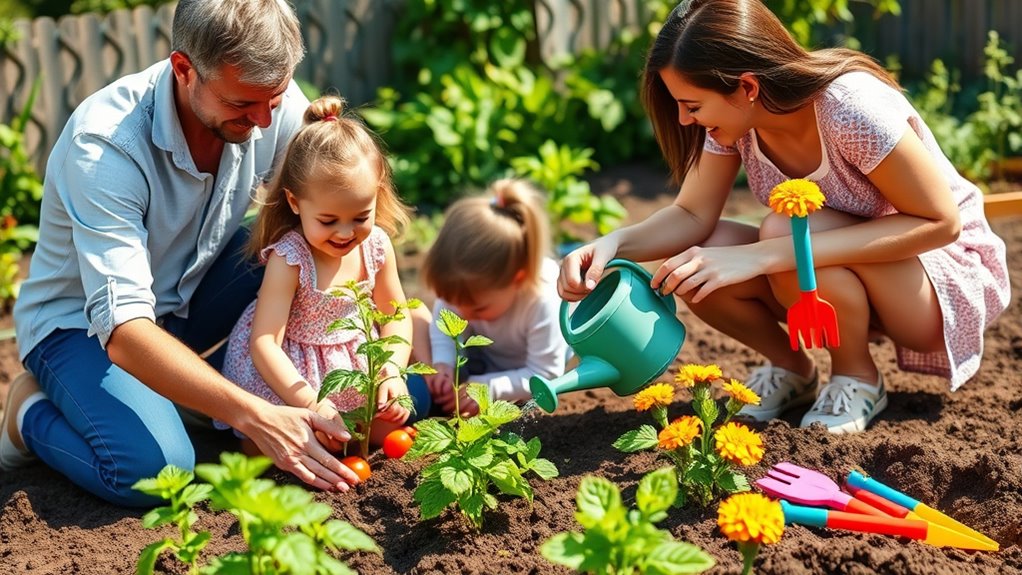
Creating a family garden can be an exciting way to strengthen your family’s bonds while nurturing a shared passion. To guarantee success, involve everyone in planning and decision-making so everyone feels invested.
Start small with manageable projects to avoid overwhelming novice gardeners. Choose a location close to your home to encourage regular visits and maintenance. Set clear goals for what you want to achieve, and research local climate and soil conditions for suitable plants.
Select easy-to-grow varieties like lettuce and tomatoes, focusing on favorite foods to boost involvement. Make the space accessible with raised beds, and include seating areas for relaxation.
Finally, assign tasks based on age and ability, celebrating harvests together to reinforce family connections.
Frequently Asked Questions
What Gardening Tools Are Safe for Children to Use?
When choosing gardening tools for children, you’ll want to focus on safety and usability.
Look for kid-friendly tools like trowels, watering cans, and gloves designed for small hands. Guarantee they’ve rounded edges, soft handles, and no sharp points.
Opt for tools made from non-toxic materials and brightly colored with FDA-safe dyes.
Always supervise your child while they’re using tools, and teach them proper usage to prevent accidents.
How Do We Start a Garden in Small Spaces?
To start a garden in small spaces, first assess your available area, whether it’s a balcony or yard.
Choose compact plant varieties, like dwarf tomatoes or patio peppers, to maximize growth.
Incorporate vertical gardening techniques using trellises for climbing plants.
Raised beds help with soil control and reduce weeds.
Finally, consider season extension methods like cold frames to make the most of your limited space and enjoy fresh produce throughout the year.
What Are the Best Plants for Beginner Family Gardeners?
Imagine planting your first seed like starting a new adventure. For beginner family gardeners, baby greens, radishes, and zucchini are perfect choices. They grow quickly, letting you enjoy the fruits of your labor with minimal fuss.
Herbs like basil and mint are forgiving, while colorful flowers like sunflowers and nasturtiums brighten your garden. Choose plants your family loves to eat, making gardening a delightful journey you can share together.
How Can We Keep Pests Away Without Chemicals?
To keep pests away without chemicals, you can use organic methods like neem oil or spinosad, which target insects effectively.
Implement natural barriers like floating row covers and handpick pests when you spot them.
Consider planting companion plants that repel pests or attract beneficial insects. You might also try beneficial nematodes for added protection.
Maintaining healthy soil through composting and crop rotation helps create a thriving garden ecosystem that naturally deters pests.
What Should We Do if Our Plants Don’T Grow?
If your plants aren’t growing, start by checking their water levels; they might be too dry or overwatered.
Look at their light exposure—are they getting the right amount?
Nutrient deficiencies could also be the culprit; consider adding fertilizers.
Inspect the soil temperature and make certain it’s ideal.
Finally, keep an eye out for pests or diseases that might be affecting their health.
Adjust these factors, and you should see improvement soon!
Conclusion
Gardening together as a family really helps you grow closer while you cultivate your plants. Not only do you reap the health and nutritional benefits, but you also create lasting memories and strengthen your bonds. Plus, you’re teaching your kids valuable lessons about nature and teamwork. So, dig in and get your hands dirty—you’ll find that nurturing a garden is just like nurturing relationships; it takes time, but the rewards are worth every bit of effort!
